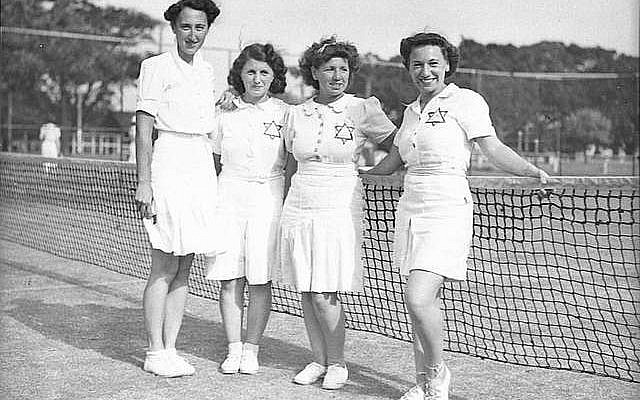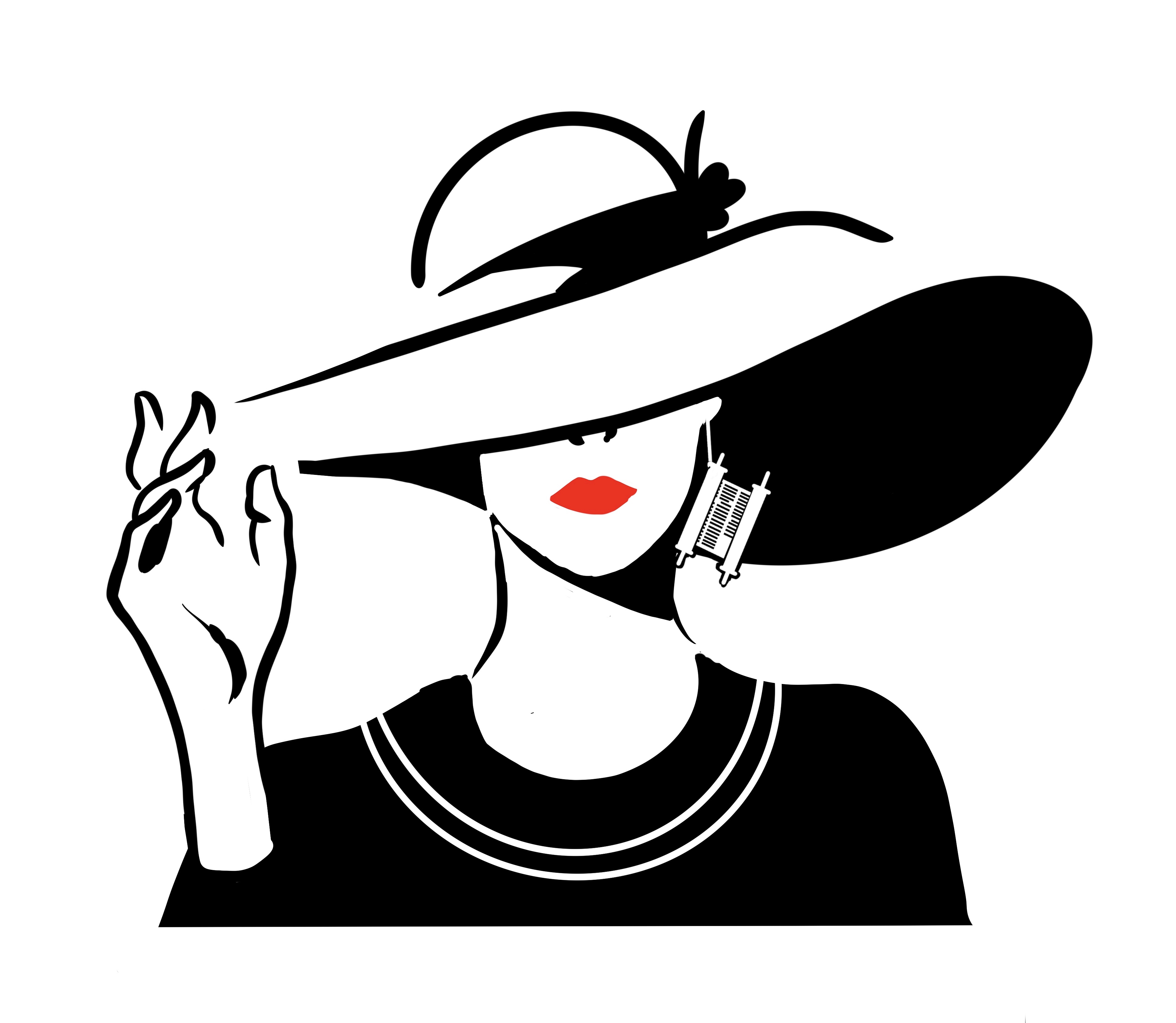
Jewish tennis players, New South Wales. State Library of NSW
Sport was often the main news item on the front pages of the Australian newspapers. As an idealistic teenager, I was indignant and distressed.
Be glad, my father would say, that you live in a country where sport is on the front page.
This from a man who told me that he loved a young woman so much that he tattooed her phone number on his forearm.
His beloved Australia – the safe haven where Holocaust survivors rebuilt their lives – is looking a lot less like paradise nowadays. A few days ago, legislation criminalizing the Nazi salute and the public display of and trade in Nazi hate symbols was passed with unanimous support by the Australian government. My father has not lived to see this fateful day – he would have been so pained to realize that the Nazis have arrived in Australia even though he would have been relieved to know that the Australian government has taken decisive action.
And this week, students at the University of Melbourne are being encouraged by the ‘unimelbforpalestine’ group to ‘Wear your Keffiyeh to Graduation.’ This at my beloved University of Melbourne where I graduated with a tear, thinking of my parents and their wider circle who were denied an education and worked with dogged determination in order to survive in Australia and raise their families.
In a recent article, Joe Gersh reflects on his advocacy for Jewish students on campus in Australia in 1975. He was a 19-year-old student with the princely title of President of the Australasian Union of Jewish Students (AUJS) and wrote a report, “The AUS Campaign” in response to anti-Israel activism by the Australian Union of Students (AUS). Re-reading his report decades later, he comments:
What struck me, in re-reading my report, was that at the time anti-Israel activism was confined to extremists; it was recognised as fringe by the majority of students. Today, the student extremists have become the establishment. They are the professors. And not only the professors. They also run the National Tertiary Education Union (NTEU).
His conclusion is a warning:
What was once fringe, would now be considered mainstream, at least in the campus environment. What was once questionable, would now be considered the received wisdom. What was then considered a tendentious worldview, would now be the stuff of academic teaching and learning. Not everywhere, but overwhelmingly.
The chickens have come home to roost.
Having said that, university politics was of no interest, or frankly, any relevance to my family. My parents and their fellow survivors found paradise in Melbourne and their gratitude knew no bounds. It was a feeling transmitted to the next generation, although I always had a gnawing feeling of ‘otherness’ which meant I never felt like a ‘fair dinkum’ Aussie.
Inherited Trauma or Inherited Resilience?
Inherited trauma, the idea that the emotional trauma of parents may change their children’s biology, has been used to explain the psychological difficulties experienced by some children and grandchildren of Holocaust survivors. Since Black Saturday, there has been a lot of discussion about the psychological trauma of those who survived the music festival and the ravaged kibbutzim, the soldiers and the hostages. There is an unprecedented demand for mental health services in Israel as the whole country grapples with both the physical and existential impact of the war and its legacy for successive generations.
Since Black Saturday, I’ve been thinking a lot about inherited resilience – perhaps it’s the flip side of inherited trauma, or maybe they simply complement each other. Inherited resilience enabled Holocaust survivors in Australia overcome Jewish suffering in Europe to reimagine and rebuild their lives in paradise. Melbourne’s unique Buchenwald Ball, an evening of dancing and singing centered around a group of Buchenwald survivors and their families, is a tribute to inherited resilience, as is Hanukkah that we celebrate this week and other Jewish holidays and memorialization dates.
While it’s too early to fully understand the long-term impact of Black Saturday, we do know that Israel has a strong resilience muscle – every war since 1948 has forced its citizens to confront personal and collective tragedies. The work of civil society organizations in Israel has been an exemplar of inherited communal resilience since October 7th, facilitating incredible acts of kindness and generosity across the country. Inherited resilience may even come as a surprise to a person who suddenly finds an inner strength that was dormant and never called upon. We’ve listened to the heroic resilience of the families of the hostages, and we’ve watched the pained resilience of the parents burying their soldier children. Did they imagine they could rise to this moment?
It is the Diasporic version of inherited resilience that enables us to confront antisemitism rather than be cowed by it. In November 2023, a statement by Australian Holocaust survivors was issued in the wake of increased antisemitism. [Readers should know that according to the 2021 census there are just under 100,000 Jews in Australia, accounting for .4% of the population. Muslims account for 3.2% of the population]
As their statement explained, these survivors are:
the last witnesses to the unspeakable horrors of the Nazi regime. We are witnesses to the antisemitic propaganda that turned our friends, neighbours and the general public against us in Europe. We remember the six million Jewish lives lost because of this hatred…Antisemitism is one of the world’s oldest and most contagious viruses. We ask all Australians to denounce the antisemitism and hatred that we see today in our beautiful country and across the globe. We ask you to stand with us.
This group of survivors is not scared to call it out.
Other things are happening in Australia that my parents could never have imagined; a group of pro-Palestine protestors demonstrating at the Crowne Plaza hotel lobby so that visiting relatives of Israeli hostages require police protection; pro-Palestine protests in the streets of Australia’s capital cities every weekend, and most disturbingly, chants of Gas the Jews outside the Sydney Opera House, a World Heritage site recognised as a masterpiece of ‘human creative genius.’ Yep, so much genius…this is not the Australia I remember.
I’m worried that a mutation may disrupt the chain of inherited resilience, particularly in the Diaspora. Antisemitism has corralled the troops – be it rallies supporting Israel, fundraising events, social media push-back, letters to politicians or advocacy for students on campus. These all demonstrate communal solidarity however they are not long-term strategies for embedding communal resilience. The lack of investment in both excellent Jewish education and nuanced Israel-related experiences is short-sighted, and the paucity of a strong and Jewishly-literate leadership has left us wanting. It has also contributed to a great deal of ambivalence about Israel in the Diaspora which is now coming to the fore, especially amongst young Jews.
I’m sad to admit it, but there are times when I’m glad that most Holocaust survivors are not alive anymore to see what has become of us.
In fact, nowadays, I wish that sport was indeed the main item on the front page of newspapers around the world.
